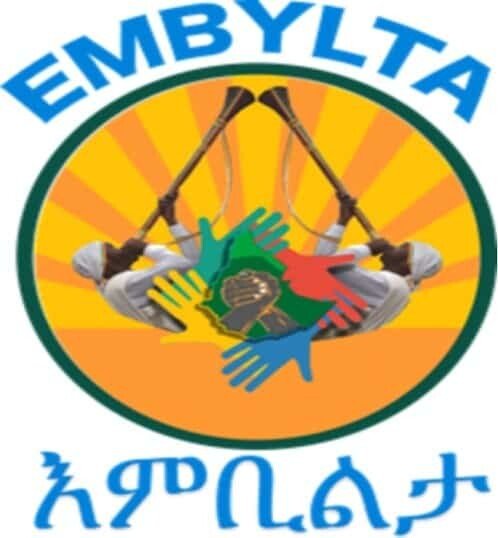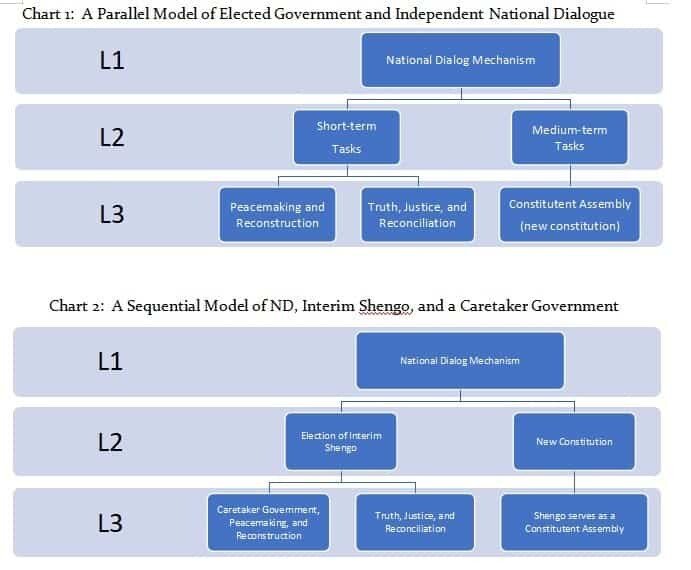
Ethiopia is a culturally diverse country, a nation of ethnolinguistic minorities, with a solid national identity. And yet, its political class is bafflingly polarized, thereby eroding its unity. This polarization is institutionalized in the ethnocratic constitution, discriminatory appointments to public offices, and political identity linked to administrative boundaries. This three-decades-old system has inevitably eroded national identity and undermined the rule of law to the point of making political violence, and even civil strife as a method of rule, tragically recurrent. Extricating the country from endemic instability through a new political settlement calls for a robust national dialogue whose endgame should be a citizen-based constitution by a modality of inclusiveness and independence.
National Dialog (ND) is a catch-all deliberative process that needs to be fleshed out with concrete pillars to fit country circumstances. As a political pact of engaged civil-society and political organizations, it can serve as an effective instrument of conflict resolution and even political transformation. Initiated and overseen by an authoritarian regime, it can be a window-dressing exercise designed to perpetuate cycles of conflict and stall democratic transitions.
IMBYLTA believes an appropriately designed ND mechanism can serve as an effective post-conflict political settlement instrument for power-sharing in Ethiopia. Therefore, its mandate must encompass three goals: peacebuilding, reconciliation, and constitutional reform. In other words, procedurally fair elections based on substantively defective or exclusionary institutions bring neither stability nor freedom.
In our considered judgment, ND also entails three sequential stages in the specific context of Ethiopia. The first stage is peacebuilding and rebuilding. The second stage is truth, justice, and reconciliation. The third stage is ratifying a citizen-based constitution on which consequential elections can be held.
Based on the experiences of several countries (Tunisia, Yemen, Colombia, and South Africa), NDs have a higher likelihood of success when they help chart a roadmap that incorporates certain core principles: inclusion of all fundamental stakeholders at all stages of deliberation; transparency, and broad and meaningful public participation; a blueprint for systemic transformation by focusing on the root causes of endemic crises; a credible convener that is neutral and willing to provide financial and technical assistance; a clear mandate and appropriately tailored structures, rules, and procedures; and an implementation plan for the agreed-upon deliverables.
Ethnicist elites have much to fear from majoritarian democracy—hence, their propensity to manipulative dictatorship. Extricating Ethiopia from the predicament of the exclusionary silo of political ethnicity also requires a roadmap that takes context seriously. The context for the initiation of the ND process is also critical for formulating an appropriate modality for decision-making and consensus-building. Two prominent scenarios are worth contemplating under the current circumstances of an ongoing civil war involving tens of millions of people and high firepower.
The Transition ND Process (የሽግግር ሂደት) if the ruling Prosperity Parts can hold the Center
The ruling Prosperity Party, with over 95% of the seats in the lower Parliament, has recently established a national dialogue commission (NDC፣ አገራዊ ምክክር ጉባዔ) by an act of Parliament. This means there are two parallel processes: the elected Government will carry out the business of the Government for the duration of the electoral cycle, while the NDC will independently investigate the causes, consequences, and solutions to profound problems. The need for an independent ND arose because Ethiopia has endured and continues to endure ethnic pogroms, destructive civil wars, and violent claims and counterclaims of regional governments over land rights for three decades now. To restore peace and security, confidence-building measures such as the release of all non-violent political prisoners to ensure that the present will not be allowed to be held hostage to the past.
The Commission will have 11 independent members and three years to report its findings and recommendations to Parliament. Its mandate is expressed in overly generalized terms to investigate, through a three-yearlong dialogue with stakeholders, the root causes of the country’s persistent problems and to suggest solutions. While the language of the “sky is the limit” may appear hopeful, the track record of other government-established commissions with ill-defined mandates (such as the Peace Commission, and Boundary and Identity Commission) is not encouraging. The tale-tell signs are that the Government-directed ND will prove to be a mask for internal power struggles between those who control the State, those who are out of power, and those who aspire to power hiding within the deep state.
As shown in Chart 1, the Peace and Reconstruction stage will have to address several urgent issues through a series of representative, deliberative forums, at least in each Woreda and the bigger cities. These include cessation of hostilities, the disarmament and demobilization of combatants, settling disputes over administrative boundaries, restoration of all internationally-recognized human and civil rights, and the terms of releasing political prisoners. The Government, in tandem, must also ensure citizen security by cleaning house by purging malign actors who have managed to insert themselves in the federal bureaucracy and security services over the past four years.
In the second stage, the NDC will have to develop a national-unity agenda for the inclusion of groups in the deeper ND mechanism—truth, justice, and reconciliation. It will oversee establishing a Truth, Justice, and Reconciliation Commission (TJR) to investigate all sorts of crimes committed by state and non-state actors since 1991 (preferably since 1974). The punishments may include forgiveness with confessions, light sentences with restitution, and recourse to the courts for serious crimes. Based on the facts, it will then establish a system of restorative justice based on Ethiopian customary and civil law as well as international law.
In the third and final stage, it will have to oversee the election of a Constituent Assembly to oversee the drafting and approval of a citizen-based constitution followed by free and fair elections. We provide more details on this phase of a robust ND below.
The Transitional Government Process (የሽግግር መንግስት) if the ruling Prosperity Party collapses
The dual-track approach of an elected government allowing an independent ND process may not be a viable option. If regime fragility becomes an eventuality, Ethiopianist civic and political activism and foreign brokers will offer an alternative roadmap of a transitional government overseen by an elected interim parliament (aka Shengo). As we note below, the Shengo will establish a caretaker government, several commissions to investigate and overhaul dysfunctional institutions, and a constitution commission to draft the citizenship-based constitution to replace the ethnic-based one.
As shown in Chart 2, a genuine ND mechanism organizes the election of a legitimate transitional national Shengo (Parliament), which is critical to stem administrative chaos and undertake structural reforms. The Shengo suspends the existing federal and regional constitutions and finalizes a transition charter for three years or so.
As spelled out in the IMBYLTA’s Declaration of April 2021, the essential characteristics and mission of the Shengo are as follows:
- The Shengo comprises some 600 members elected from each of the 550 Woreda and influential members of national and regional political parties and CSO leaders. As is typical with lustration laws, senior members of the ruling party will have to be excluded from the Shengo to minimize packing the Shengo by status-quo politicians.
- The Shengo prepares a Transitional Charter or interim constitution, which will define its power and responsibilities. The significant features are:
- Establishing and supervising a Caretaker Administration of Professional Technocrats and Security Services;
- Establishing a Constitution-drafting commission. The Shengo may serve as a Constituent Assembly;
- Establishing other notable commissions to clean up the mess: Truth, justice, and reconciliation, party companies, electoral rules, regional boundaries and administrations, and language policy (official and working); and
- Overseeing a credible national population and housing census.
- The Shengo provides national-consensus guidelines regarding the nature and content of the new constitution:
- Recognizing Official languages (Amharic and English) and Working languages (Oromiffa, Tigrigna, and Somaligna). Others will follow as the country develops.
- Territorially delimiting of administrative regions (ክፍላተ-ሃገራት) based on a combination of residency, economic viability, consent, and longstanding local identity;
- Checks, Balances, Judicial Independence, and a Constitutional Court;
- Security of Property Rights, especially Land; and
- Dual citizenship Rights for Cosmopolitan Ethiopians.
Whether we choose Option 1 or Option 2 for strategic or tactical reasons, we must be faithful to our enduring values of equity, inclusion, unity, and sovereignty. The takeaways from the design of an Ethiopia-tailored ND process must therefore recognize the following realities:
- Structural crises require structural solutions.
- The political order in Ethiopia today is founded on divisive ethnic discrimination, absolutism, and the institutionalized plunder of public property by abusing public office.
- To build a prosperous and democratic country, engaged citizens must end the culture of violent state capture, impunity, and exclusionary politics.
- A consensus Roadmap is needed to get us from the unacceptable “here” to the desirable “there” by embracing peace, justice, equality, and unity.
This note provided a synopsis of our dispassionate proposals that are designed to inform the public debate on how best to build a free and prosperous Ethiopia. Please join IMBYLTA in this worthy endeavor.

Our website: hageraden.org.
Thank you.
= = = = =

With all due respect, IMBYLTA’s mission is doomed to fail. Why on earth is English listed as an Official Language? Has the Imbylta group reached out to any of the woreda officials? Why should the public trust in the establishment of so many commissions when the existing government bodies are already failing? What is Imbylta’s definition of “Cosmpolitan Ethiopians”? Why reference South Africa when their truth and reconciliation commission was an utter failure? What is Imbylta’s plan to tackle economic inequality? How is Imbylta going to succeed when others partaking in the national dialogue will certainly be ethno-federalists? Why establish another interim constitution when the last “interim” constitution ie the one we currently have was created 30 years ago? Also, who is Imbylta, and what are the interests of the individual stakeholders? Lol talk about out of touch, and out of reality.
Cheers,
MJ
For what it is worth here is humble commentary on ETHIOPIA — THE ANCIENT COUNTRY AROUND THE GLOB.
HUMBLE ARTICLE
I have a question— a sincere question, without any hint of malice, in any way.
First and Foremost:
I am ardent believer that ETHIOPIA SHOULD BE AS ETHIOPIAN AS IT HAD EVER BEEN, as ONE ETHIOPIA, FOR ALL ETHIOPIANS, NO IFS and BUTS — REGARDLESS of any nature of internal unpleasantness that any country around the GLOBE experience in their internal administration. If this is not acceptable , Ethiopians should accept, in grace, the fragmentation of the oldest country in the world into pieces. In a bizarre world, that may be happiness to the 21s tCentury generation of Ethiopians. FULL STOP.
Second:
EVERY ETHIOPIAN , left and right; up and down, should have EQUAL OPPORTUNITY in every aspect of ETHIOPIAN LIFE. This is crucial.
————————————————— ————————————————————————————–
Now to Humble Commentary on the INTERNAL AFFAIRS of ETHIOPIA
1st Isn’t it true that there has never been sociological EQUALITIES in Ethiopia?
2nd Isn’t it true that, for seemingly time immemorial, the Amhara Race had special status over the other
RACES in Ethiopia?
3rd. Isn’t it also true that, for time immemorial, no efforts have been undertaken to balance the identity of
Ethiopian – ness upon ALL Ethiopian Races.?
4th. Isn’t it also true that even the savagery of the Ethiopian Military Derg had a part of racism?
5th. Isn’t also true, without a shadow of doubt, that the Tigray take over was significantly racial?
6th. Isn’t it also true that the animosity against Tigray had to do with racial issue >>> I.e. the loss of
authority and tranquility over multiple generations?
7th. Finally, to repeat, isn’t it true the historical governance of Ethiopia was, and still is, RACIAL?
CONCLUSION:
ETHIOPIA, for its own benefit, should be self-obliged to accept its PAST HISTORY and start a NEW WAY of LIFE — FREE from sociological madness and tune itself to REALITY >>> PERTINENT TO ALL. After all, disintegration requires no inginuity
GOOD :LUCK TO ETHIOPIA